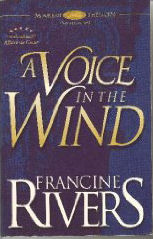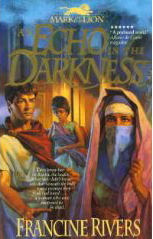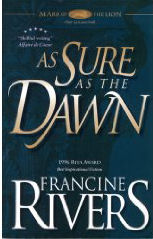|
 The
Mark of the Lion series consists of three books: A Voice in
the Wind, An Echo in the Darkness, and As Sure as
the Dawn. A
fascinating tale that is a combination of One Night with the
King, Gladiator, and the HBO miniseries Rome
(but without the R-rated elements), this compelling drama focuses on
the life of Hadassah, a young Jewish Christian slave who is brought to
Rome after the destruction of Jerusalem in AD 70. Hadassah is pure and
sweet and brings her newfound faith in God to the wealthy Valerian
household, where she serves the beautiful Julia Valerian. The
Mark of the Lion series consists of three books: A Voice in
the Wind, An Echo in the Darkness, and As Sure as
the Dawn. A
fascinating tale that is a combination of One Night with the
King, Gladiator, and the HBO miniseries Rome
(but without the R-rated elements), this compelling drama focuses on
the life of Hadassah, a young Jewish Christian slave who is brought to
Rome after the destruction of Jerusalem in AD 70. Hadassah is pure and
sweet and brings her newfound faith in God to the wealthy Valerian
household, where she serves the beautiful Julia Valerian. Despite being
surrounded by the decadent, immorality of Roman culture, Hadassah draws
strength from her faith and impacts the lives of every member of the
family, particularly Julia’s handsome brother, Marcus. She wins his
heart, but convinces him to restrain his passion out of respect for her
beliefs—she is a Christian and cannot be united with an unbeliever. It
is this tension between the two that keeps the story moving forward so
that the pages practically turn themselves. Their relationship paints a
picture of the power of the Roman world battling against the gentle,
childlike faith in the Christian God. Despite being
surrounded by the decadent, immorality of Roman culture, Hadassah draws
strength from her faith and impacts the lives of every member of the
family, particularly Julia’s handsome brother, Marcus. She wins his
heart, but convinces him to restrain his passion out of respect for her
beliefs—she is a Christian and cannot be united with an unbeliever. It
is this tension between the two that keeps the story moving forward so
that the pages practically turn themselves. Their relationship paints a
picture of the power of the Roman world battling against the gentle,
childlike faith in the Christian God.
 Added to the romantic thread of
Hadassah and Marcus is the story of Atretes, a Germanic tribal prince,
who is captured and brought to Rome as a gladiator. Wildly handsome and
strong, Atretes wins the favor of the arena crowds, as well as the
affections of Julia Valerian. Bent on revenge, he refuses to embrace
the power and fame of being an undefeated fighter, opting instead to
keep his heart hardened and cold. But through his trysts with Julia, he
encounters Hadassah and sees in her the hope of something beyond what
Rome has to offer. Added to the romantic thread of
Hadassah and Marcus is the story of Atretes, a Germanic tribal prince,
who is captured and brought to Rome as a gladiator. Wildly handsome and
strong, Atretes wins the favor of the arena crowds, as well as the
affections of Julia Valerian. Bent on revenge, he refuses to embrace
the power and fame of being an undefeated fighter, opting instead to
keep his heart hardened and cold. But through his trysts with Julia, he
encounters Hadassah and sees in her the hope of something beyond what
Rome has to offer.
|
With
the powerful love story,
political and societal intrigue, not to mention the blood and gore,
this story has all the makings of a wonderful, compelling TV
miniseries. The lavish Roman setting of wealth and splendor—from the
hair and clothing, to the furniture and architecture, even the
abundance of various food and drink—adds a rich texture to the story,
providing a beautiful backdrop for the characters to play out their
destinies. And of course, the scenes in the arena, including chariot
racing, sword fighting, and battles with lions and other wild beasts,
would satisfy the most blood-thirsty of television viewers. But it is
the consistent theme of faith in God and Messiah prevailing in even the
most unlikely of circumstances that gives the story its heart. Even in
an opulent culture that existed thousands of years ago, money, fame,
and power were insufficient to bring the joy and fulfillment to life
that are embodied in the life of a sincere Christian. The light of
truth that Hadassah brings to everyone she encounters is what gives her
the ultimate power—for in her spirit, she bears the mark of the lion of
the tribe of Judah.
I
would think an epic story like this could attract the attention of the
top directors in Hollywood, as well as an all-star A-list cast,
provided the Christian themes were presented truthfully and not in a
heavy-handed manner. Because of the embodiment of history, extravagant
sets, and special effects, there is no reason a secular audience
wouldn’t fall in love with this story like they did Russell Crowe’s Gladiator.
In fact, this could be a classic shown to generations to come—and even
in schools—as an excellent picture of what Roman life was like. It
would also introduce this fabulous series to the next generation of
readers, both Christian and secular alike, and to all the other works
written by the great Francine Rivers.
For those of you out there who
haven’t picked up this series because of the complexity of the story or
the number of pages, don’t wait for the miniseries—read it now. But
make sure you have all three books on hand or you will deeply regret
it! The only time I remember racing to the library before the doors
closed was after I finished book one in this series. It is a treasure
that certainly deserves all the best that Hollywood has to offer.
|











